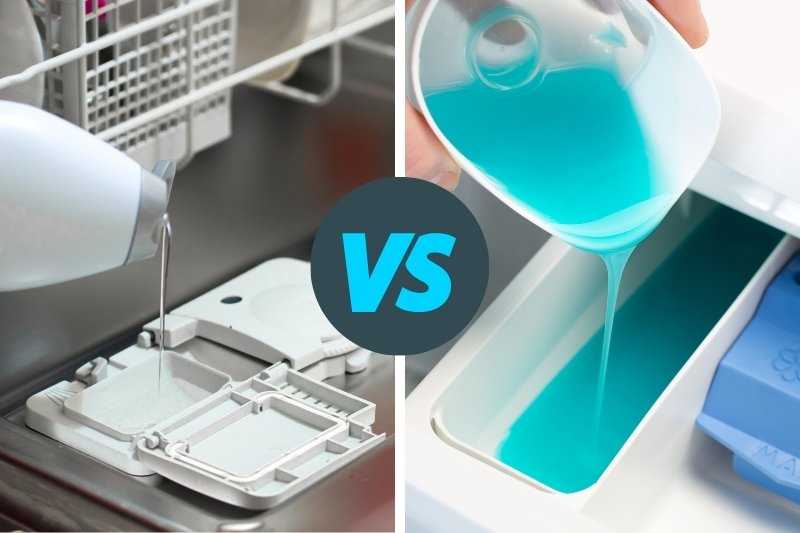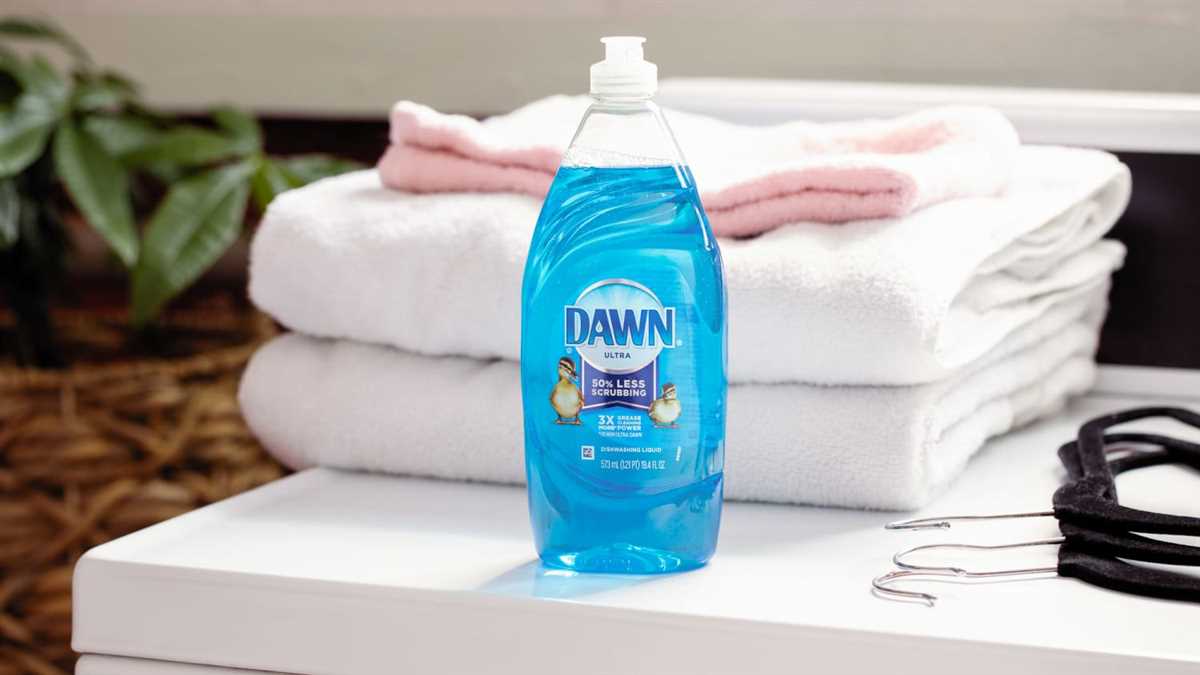




When it comes to keeping our clothes and dishes clean, the type of detergent we choose plays a crucial role in achieving the desired results. However, with so many options available on the market, it can be challenging to understand the distinctions between dishwasher and laundry detergent. In this article, we will delve into the differences between these two types of detergents and explore which one is best suited for specific cleaning tasks.
Dishwasher detergent is specifically formulated to remove food particles, grease, and stains from dishes and other kitchen utensils. It is designed to work in conjunction with the high temperatures and intense water pressure of a dishwasher. Dishwasher detergent typically contains enzymes and surfactants that effectively break down and remove tough food residues, leaving dishes sparkling clean.
Laundry detergent, on the other hand, is specially formulated to clean and remove stains from clothing and fabrics. It contains a mix of enzymes, surfactants, and bleaching agents, which work together to break down and lift stains, dirt, and grime from clothes. Laundry detergent is typically available in liquid, powder, or pod form and can be used in both traditional and high-efficiency washing machines.
While dishwasher detergent is effective at removing food particles and grease from dishes, it is not suitable for washing clothes. Similarly, laundry detergent may not effectively clean dishes and can leave behind residue that affects the taste and cleanliness of your utensils.
It is important to choose the right detergent for the task at hand to ensure optimal cleaning results. By understanding the distinctions between dishwasher and laundry detergent, you can make an informed decision and keep your dishes and clothes looking their best.
Understanding the Differences
When it comes to choosing the right detergent, it’s important to understand the differences between dishwasher detergent and laundry detergent. While both types of detergent are designed to clean, they are specifically formulated for different purposes and should not be used interchangeably.
Dishwasher Detergent

Dishwasher detergent is specifically formulated to remove food particles, grease, and stains from dishes, glasses, and utensils. It is designed to work in conjunction with the high temperatures and powerful jets of water in a dishwasher to effectively clean and sanitize your dishes. Dishwasher detergent often contains enzymes and surfactants that help break down tough food residues and remove greasy stains.
When using dishwasher detergent, it’s important to follow the instructions on the packaging and use the recommended amount for your specific dishwasher. Using too much detergent can lead to excessive sudsing and poor cleaning performance, while using too little may result in dishes not being fully cleaned or sanitized.
Laundry Detergent
Laundry detergent, on the other hand, is formulated to remove dirt, stains, and odors from clothing, linens, and other fabrics. It often contains enzymes, surfactants, and other additives that help break down stains and dirt particles, and can be used in both high-efficiency and traditional washing machines.
It’s important to choose a laundry detergent that is suitable for the type of fabric you are washing, as different types of fabrics may require different cleaning agents or special care. Additionally, you should follow the instructions on the packaging and use the recommended amount of detergent for your specific laundry load.
Conclusion
Understanding the differences between dishwasher detergent and laundry detergent is essential for achieving optimal cleaning results in both your dishwasher and washing machine. Using the appropriate detergent for each task will help ensure that your dishes are clean and sanitized, and your clothes and fabrics are fresh and stain-free.
Remember to always read and follow the instructions on the packaging of your detergent, and consult the manufacturer’s recommendations if you have any doubts or concerns.
Factors to Consider
When choosing between dishwasher detergent and laundry detergent for your cleaning needs, there are several factors to consider. The type of detergent you choose can have an impact on the cleanliness of your dishes or clothes, as well as the overall effectiveness of your cleaning routine. Here are some important factors to consider:
Cleaning Power
One of the main factors to consider is the cleaning power of the detergent. Dishwasher detergents are specifically formulated to break down food particles and grease, and are designed to work in the high temperatures of a dishwasher. On the other hand, laundry detergents are designed to remove stains and dirt from fabrics, with a focus on removing oils and other substances that can cling to clothing.
Suitable Surfaces

Another important factor to consider is the surfaces or materials that the detergent is suitable for. Dishwasher detergents are typically meant for use on glass, ceramics, and metal surfaces, while laundry detergents are designed for use on a wide range of fabrics. Using the wrong detergent on the wrong surface can lead to damage or ineffective cleaning.
Safety and Ingredients
It’s important to consider the safety and ingredients of the detergent you choose. Dishwasher detergents often contain enzymes and harsh chemicals that can be harmful if ingested or come into contact with skin. Laundry detergents, on the other hand, may contain bleaching agents and other additives that can cause irritation or allergic reactions. Always read the labels and follow the safety instructions to ensure the detergent is safe for use.
Sustainability and Eco-Friendliness
In recent years, there has been increased focus on sustainability and eco-friendliness in cleaning products. Some dishwasher and laundry detergents offer eco-friendly options, such as biodegradable formulas or packaging made from recycled materials. If you are concerned about the environmental impact of your cleaning routine, be sure to choose a detergent that aligns with your values.
Cost and Value
Finally, consider the cost and value of the detergent. Dishwasher detergents can be more expensive per load compared to laundry detergents, but they may also offer better cleaning power and convenience for certain situations. Evaluate the cost per use and the overall value of the detergent to determine which option is most suitable for your budget and cleaning needs.
Dishwasher Detergent
Dishwasher detergent is specifically designed for use in automatic dishwashers. It is formulated to remove food residue, grease, and stains from dishes, glasses, and utensils, and to prevent the redeposition of dirt and grime. Dishwasher detergent comes in different forms such as powder, gel, and tablets. These different forms offer various advantages and may be preferred based on personal preference and dishwasher type.
Types of Dishwasher Detergents

1. Powder: Dishwasher detergent in powder form is the most common and traditional type. It typically comes in a box or canister and is made up of small granules. Powder detergent is known for its versatility and effectiveness in removing tough stains and grease. It can be used for both regular and heavy-duty cycles.
2. Gel: Gel-based dishwasher detergent is a more modern formulation that is often preferred for its convenience. It comes in a liquid state and is poured directly into the dishwasher dispenser. Gel detergent is usually more concentrated, requiring less product per load. It is great for short cycles and delicate items.
3. Tablets: Dishwasher detergent tablets are pre-measured, single-use capsules that contain a combination of powdered detergent, rinse aid, and other cleaning additives. They offer convenience and simplicity as they eliminate the need for measuring or pouring detergent. Simply place the tablet in the dishwasher dispenser and let it do its job. Tablets are known for their superior cleaning performance and are especially popular for quick and easy dishwashing.
Choosing the Right Dishwasher Detergent
When selecting a dishwasher detergent, there are a few factors to consider:
- Dishwasher Type: Different dishwashers may have specific requirements regarding the type of detergent they can handle. Check the manufacturer’s recommendations or refer to the dishwasher’s manual to ensure compatibility.
- Cleaning Power: Consider the level of cleaning power needed for your dishes. If you often have heavily soiled or greasy dishes, a powder or tablet detergent might be more suitable. For everyday cleaning, a gel-based detergent may be sufficient.
- Cost and Value: Compare the pricing and value of different dishwasher detergents. Some premium brands offer enhanced features such as added shine or spot-free results, but they may come at a higher cost. Consider your budget and specific cleaning needs when making a choice.
In conclusion, dishwasher detergent is specially formulated for use in automatic dishwashers to effectively clean and remove dirt and stains from dishes, glasses, and utensils. There are various types of detergents available, including powder, gel, and tablets, each offering different advantages. When selecting a dishwasher detergent, consider the dishwasher type, desired cleaning power, and cost to choose the most suitable option for your needs.
Laundry Detergent
Laundry detergent is a specialized cleaning agent designed specifically for washing clothes. It is formulated to remove dirt, stains, and odors from various types of fabric. Laundry detergents come in different forms, including powders, liquids, and pods, and they are available in a wide range of scents and formulations to suit different needs and preferences.
Types of Laundry Detergents
There are several types of laundry detergents available on the market:
- Regular detergent: This is the most common type of laundry detergent and is suitable for everyday use. It effectively cleans clothes, removes stains, and leaves them smelling fresh.
- High-efficiency (HE) detergent: HE detergent is specifically formulated for use in high-efficiency washing machines. These machines use less water and are more energy-efficient, so they require a different type of detergent that produces less suds and can be rinsed more easily.
- Colour-safe detergent: This type of detergent is designed to help preserve the colors of your clothes, keeping them vibrant and preventing fading.
- Sensitive skin detergent: If you have sensitive skin or allergies, you may want to consider using a detergent that is specifically formulated for sensitive skin. These detergents are fragrance-free and have a milder formula that is less likely to cause skin irritation.
- Environmentally friendly detergent: For those who are environmentally conscious, there are laundry detergents available that are made from plant-based ingredients and are biodegradable.
How to Use Laundry Detergent
Using laundry detergent is a fairly straightforward process:
- Sort your clothes by color and fabric type, and check the care labels for any specific washing instructions.
- Measure the recommended amount of detergent according to the load size and level of dirtiness.
- Add the detergent to the washing machine before adding the clothes.
- Select the appropriate water temperature and cycle for your clothes.
- Start the washing machine and wait for the cycle to complete.
- Remove the clothes from the machine and transfer them to the dryer or hang them to air dry.
Additional Tips
Here are some additional tips for using laundry detergent effectively:
- Pre-treat stains by applying a small amount of detergent directly to the stain before washing.
- Use cold water for delicate fabrics and to help preserve the colors of your clothes.
- Don’t overload the washing machine, as this can prevent the detergent from thoroughly cleaning your clothes.
- Store laundry detergent in a cool, dry place to maintain its effectiveness.
In Conclusion
Laundry detergent is an essential product for keeping your clothes clean and fresh. With so many options available, you can easily find a detergent that suits your specific needs and preferences. By following the proper usage instructions and taking care of your clothes, you can ensure they stay clean and in good condition for longer.
Making the Right Choice
Evaluating Your Needs
When it comes to choosing the right detergent, it is important to evaluate your needs first. Consider the specific tasks you need the detergent to accomplish and the type of fabrics or surfaces you will be cleaning.
Dishwasher Detergent: If you are looking for a detergent specifically for your dishwasher, it is important to choose one that is formulated for use in automatic dishwashers. These detergents are designed to remove tough food stains and grease from your dishes, while also protecting your dishwasher from harmful buildup.
Laundry Detergent: For laundry, there are various types of detergents available depending on your specific needs. Choose a detergent that is suitable for the type of fabric you are washing, such as a gentle detergent for delicates or a heavy-duty detergent for tough stains. Additionally, consider if you prefer a liquid, powder, or pod detergent.
Considering Environmental Impact
Another important factor to consider when choosing a detergent is its environmental impact. Many detergents contain harsh chemicals that can be harmful to the environment and your health. Look for detergents that are eco-friendly and biodegradable.
Eco-friendly Features: Some detergents are labeled as environmentally friendly and may be free from harsh chemicals, synthetic fragrances, and dyes. These detergents often come in recycled packaging and are made with renewable resources.
Comparing Cost and Efficiency
Cost and efficiency are also factors to consider when making the right choice. While some detergents may be more expensive, they may also deliver better cleaning results or require a smaller amount per load.
Consider the cost per load and compare it to the effectiveness of the detergent. Pay attention to the concentration level and recommended dosage on the packaging. This will help you determine if the detergent is cost-effective in the long run.
Personal Preference
Lastly, personal preference can also play a role in choosing the right detergent. Some people may prefer a certain brand or scent, or they may have specific allergies or sensitivities to certain ingredients. It is important to consider any personal preferences or concerns when selecting a detergent.
In conclusion, choosing the right detergent involves evaluating your needs, considering the environmental impact, comparing cost and efficiency, and taking personal preferences into account. By carefully considering these factors, you can make an informed decision and ensure that your cleaning routine is effective and tailored to your specific needs.
FAQ
What is the difference between dishwasher detergent and laundry detergent?
Dishwasher detergent is specifically designed to remove food particles and grease from dishes and utensils, while laundry detergent is formulated to remove dirt and stains from clothing and linens.
Can I use laundry detergent instead of dishwasher detergent?
No, you should not use laundry detergent in your dishwasher. Laundry detergent creates excessive suds and can cause a dishwasher to overflow. It also does not contain the right enzymes and surfactants needed to effectively clean dishes.
Why is dishwasher detergent more expensive than laundry detergent?
Dishwasher detergent tends to be more expensive than laundry detergent due to its specialized formulation and higher concentration of cleaning agents. It is designed to not only remove food particles and grease, but also dissolve tough stains and prevent the redepositing of food particles on dishes.
Are there any eco-friendly options for dishwasher and laundry detergents?
Yes, there are eco-friendly options available for both dishwasher and laundry detergents. These options are formulated with plant-based ingredients and do not contain harmful chemicals or artificial fragrances. They are biodegradable and safe for the environment.













